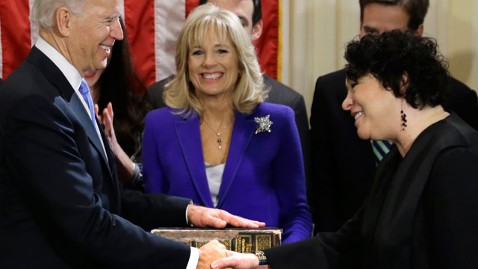Barack Hussein Obama officially began his second term as the nation’s 44th president Sunday, taking the oath of office in a low-key ceremony at the White House.
Chief Justice John G. Roberts administered the oath, and the two will repeat the process again Monday in a public celebration at the Capitol. The Constitution mandates that presidential terms begin on Jan. 20, and it is traditional when the day falls on a Sunday that the public ceremony take place the next day.
Obama took the oath in the Blue Room of the White House, with his family looking on.
The ceremony followed a morning where the president took part in a wreath-laying ceremony at Arlington National Cemetery and worshipped at a historic African-American church.
Vice President Biden got a jump on the president by taking his oath at an early-morning ceremony at his residence at the Naval Observatory. Justice Sonia Sotomayor delivered the oath, becoming the fourth woman and the first Hispanic to administer the oath to the president or vice president.
Biden was sworn in before a crowd of 120 people, surrounded by his family on a makeshift stage in an alcove.
After the oath was completed, Biden kissed Sotomayor and then hugged and kissed his wife, Jill Biden, who held a massive Biden family Bible.
“Madame Justice, these are some of my friends, and family,” Biden said, grasping Sotomayor’s hand.
The 8:21 a.m. event apparently was prompted by Sotomayor’s need to be at a Barnes and Noble in New York for an afternoon address and signing event for her new memoir, “My Beloved World.”
Biden didn’t get into specifics, but told the crowd: “I want to explain to you what a wonderful honor it was, and how much out of her way the justice had to go. She is due in New York. She has to leave right now. . .so she can catch a train — I hope I haven’t caused her to miss.”
Biden’s ceremony led to speculation about his political future--a wide range of Democratic officials, early primary state officeholders and party strategists were on hand. Among the invited were former White House chief of staff William Daley, Obama’s longtime political strategist David Axelrod, New Hampshire Gov. Maggie Hassan, House Democratic leader Nancy Pelosi and Democratic National Committee Chairwoman Debbie Wasserman Schultz.
“Of course we can always start the political calculations in terms of the number of delegates needed to secure a nomination,” said longtime Democratic strategist Donna Brazile, who was also in the crowd. “But let’s just say I see a number of superdelegates here as well.”
The Obamas sat at the front of the District’s historic Metropolitan African Methodist Episcopal Church-- known as the “national cathedral of African Methodism”--where the crowd sang Happy Birthday to Michelle Obama and the sermon featured the slogan of the president’s reelection campaign--”forward.”
The Obamas have worshipped there before in advance of Martin Luther King Day, and the church has hosted inaugural prayer services for President Bill Clinton and Vice President Al Gore.












